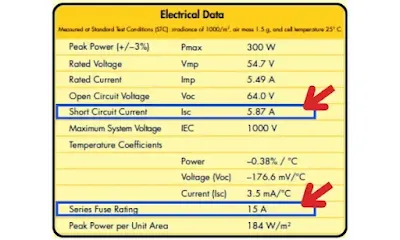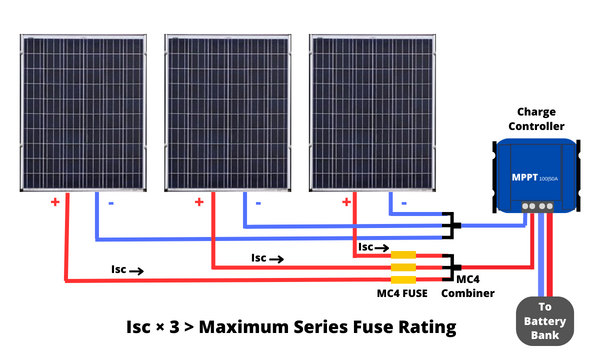Do you need fuse between solar panel and charge controller

Fuses are basically a power limiting electrical device, designed to destroy themselves instead of the equipment they are connected to. Fuses, being cheap, are far more economical than buying new equipment.
In this post, you will learn when it is required to install the fuse between the solar panel and the charge controller, and how to determine the appropriate size of the solar fuse for your solar panel.
In most cases, using a fuse between the solar panels and the charge controller is required because it protects the wires, diodes, connectors, and other internal components of the solar panel from overheating that can lead to fire accidents, or damage in the event of a short circuit or other malfunction.
However, if the solar panels are connected in series, the fuse is not required as the short circuit current cannot exceed the maximum fuse rating of the panel.
How do you know if a fuse is needed?
To determine if you need to install a fuse, you should first check the label on the back of the solar panel to find the following values:
1. Short Circuit Current (Isc) rating.
2. Maximum Series Fuse Rating.

Scenario 1: solar panels wired in parallel
If the panels are connected in parallel, the current of each panel increases while the voltage remains the same.
If the total short circuit current rating of the solar panels exceeds the maximum series fuse rating (Isc × Number of panels or panel strings in parallel > Maximum Series Fuse Rating), you should install a fuse for each positive wire from each solar panel where it connects to the MC4 Combiner to protect the wires and panels from excess current.

Scenario 2: solar panels wired in series
If the solar panels are connected in series, the array's voltage increases while the current remains the same, equal to the short-circuit current rating of the panels.
Since the short-circuit current of a solar panel is always less than the maximum series fuse rating of the panel, it is not necessary to combine the fuses.
Scenario 3: Parallel-Series connection

What Size Fuse for Solar Panel String?
A fuse (a shortened term for fusible link) is a type of protection device in electrical applications. Fuses are designed specifically to be the "weakest" link in the electrical chain.
Now that you know that you need to install a fuse and where to install it, you need to determine the appropriate size of solar panel fuse.
Minimum Rating for the Suitable Fuse:
To calculate the minimum rating for the suitable fuse for the solar panel array, two important factors are taken into account that have a significant impact on the fuse's operation.
- Fuses are designed to sense a amperage above their rated listing. So a 100 amp fuse should blow with a 100 amp charge applied to it almost instantaneously. However a sustained 88 amp load will do so as well. WHY? Well, fuses are designed to sense a pulse of power, and as such are able to be heated up over time to the same result. So a fuse running over 85% for a sustained period of time will "Slow Blow" the fuse.
- When the temperature is high, using a small fuse size can easily cause the fuses to blow.
Therefore, when sizing the fuse for a solar panel array, we use the following formula:
We multiply the Isc of the solar panels by 1.56.
We use the factor of 1.56 to avoid fuse blowing under normal operating conditions, even at high temperatures (50 °C for the junction box).
Fuse size = 1.56 × Short Circuit Current (Isc) of the panels
Application
For example, if you have three 100-watt panels connected in parallel, each producing 20 volts and 5 amps, the total electrical power will be 20 volts and 15 amps.
If the maximum series fuse rating for the panels is 10 amps, you should install a fuse for each positive wire from each solar panel where it connects to the MC4 Combiner.
Now, to determine the appropriate fuse size for the solar panels, you can use the following formula:
- Fuse size = 1.56 × Isc
Let’s assume that the Isc of the 100W solar panel is 6.2A. Using the formula:
- Fuse size = 1.56 × 6.2A = 9.7A
This gives us a fuse rating of 9.7 amps, which can be rounded up to the nearest available value, such as 10 amps.

